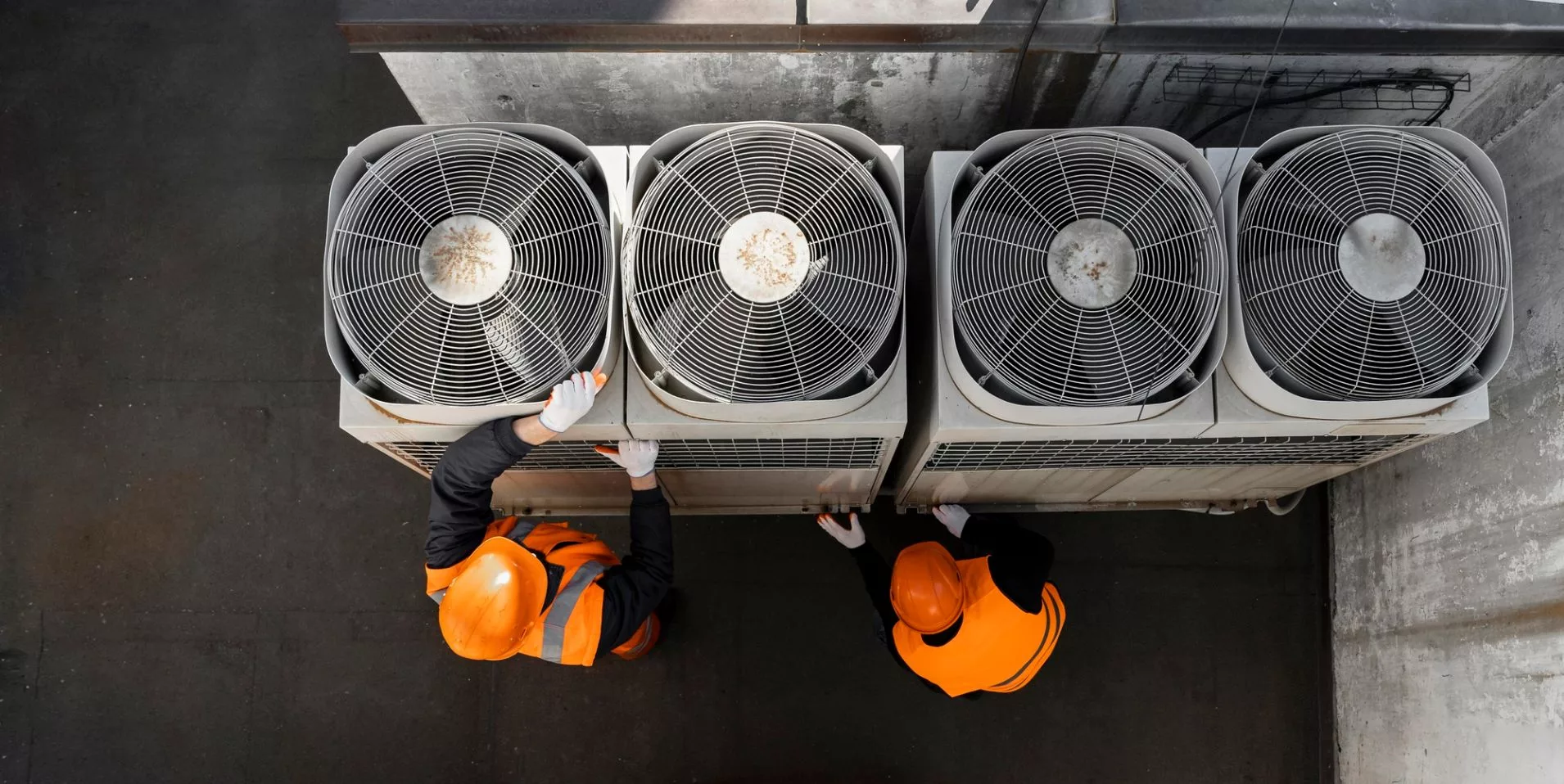In Qatar, where water is a precious resource, the efficient operation and maintenance of water treatment plants are crucial for ensuring the supply of safe and clean drinking water. Water treatment plants play a vital role in removing impurities, contaminants, and harmful microorganisms from water, making it suitable for human consumption and various industrial applications.
Water treatment plants encompass a complex network of equipment and processes, each contributing to the purification and disinfection of water. Over time, these components can deteriorate, accumulate contaminants, or suffer from mechanical failures. Regular maintenance helps identify and address these issues before they compromise the plant’s performance or lead to water quality problems.
What is a water treatment plant?
A water treatment plant is a facility that uses a variety of processes to remove impurities and contaminants from raw water sources, such as rivers, lakes, or wells, making it safe for human consumption. These impurities and contaminants can include:
- Physical impurities: Such as sand, silt, and clay
- Chemical contaminants: Such as chlorine, lead, and arsenic
- Biological contaminants: Such as bacteria, viruses, and parasites
The primary purpose of a water treatment plant is to provide clean and safe drinking water for human consumption. It also plays a crucial role in protecting public health by eliminating contaminants that can cause waterborne diseases. Additionally, treated water is used for various domestic purposes, such as cooking, bathing, and sanitation.

Important checks before maintenance of a water treatment plant
Before conducting maintenance on a water treatment plant, it is essential to perform several checks to ensure the safety and effectiveness of the maintenance procedures. These checks include:
a) Chlorine levels in the water: Chlorine is a disinfectant commonly used in water treatment. Monitoring chlorine levels ensures adequate disinfection and prevents excessive residual chlorine, which can impart an unpleasant taste and odor to the water.
b) pH level of water: The pH level indicates the acidity or alkalinity of the water. Maintaining an appropriate pH range (typically between 6.5 and 8.5) is crucial for corrosion control and optimal performance of treatment processes.
c) Water turbidity check: Turbidity measures the cloudiness of water caused by suspended particles. Low turbidity indicates clear and clean water, while high turbidity suggests the presence of impurities that need to be removed through treatment.
d) The level of dissolved oxygen in the water: Dissolved oxygen is essential for maintaining the health of aquatic life and preventing the growth of anaerobic bacteria in the water distribution system. Monitoring dissolved oxygen levels ensures that the treated water meets environmental standards.
Typical maintenance schedule for any water treatment plant
A comprehensive maintenance schedule for a water treatment plant typically involves a combination of daily, weekly, monthly, and quarterly checks and procedures. These activities aim to maintain the plant’s equipment, optimize its performance, and ensure the production of high-quality drinking water.
a) Station Check Daily: Daily checks involve visually inspecting the plant’s equipment for any signs of leaks, wear, or damage. This also includes monitoring alarms and sensors that indicate potential issues.
b) Clean it Weekly: Weekly cleaning focuses on removing debris, accumulated sediments, and potential sources of contamination from the plant’s equipment and surroundings. This helps maintain hygiene and prevent the buildup of harmful substances.
c) Monthly Station Inspection: Monthly inspections involve a more detailed examination of the plant’s equipment, including checking for corrosion, wear and tear, and proper operation of valves, pumps, and other critical components.
d) Cleaning the Station Every Three Months: Quarterly cleaning involves a more thorough cleaning of the plant’s equipment, including tanks, filters, and pipelines. This helps remove accumulated sediments, biofilms, and potential contaminants that may have built up over time.

Water treatment plant maintenance steps
Water treatment plant maintenance encompasses a wide range of activities and procedures aimed at ensuring the plant’s optimal performance and the production of safe drinking water. These steps can be broadly categorized into four main areas:
Preventive Maintenance: This involves regular inspections, cleaning, and lubrication of equipment to prevent breakdowns and extend its lifespan. This proactive approach helps minimize downtime and maintain consistent water production.
Equipment Upkeep: This involves regular maintenance and replacement of pumps, valves, filters, and other critical equipment. This ensures that the equipment operates efficiently and effectively in removing contaminants and producing clean water.
Monitoring and Control: Continuous monitoring of water quality parameters is essential to ensure that the treated water meets stringent quality standards. This includes monitoring turbidity, pH levels, chlorine residuals, and other indicators of water quality.
Record Keeping and Documentation: Maintaining detailed records of maintenance activities, equipment performance, and water quality data is crucial for tracking trends, identifying potential issues, and ensuring compliance with regulations.
Main tasks in the maintenance of a water treatment plant
The main tasks involved in maintaining a water treatment plant can be summarized as follows:
a) Cleaning: Regular cleaning of tanks, filters, pipes, and other equipment is essential to remove debris, algae growth, and scale buildup that can impair the effectiveness of treatment processes.
b) Inspection and repair: Thorough inspections of equipment, valves, piping, and electrical systems help identify potential problems and wear and tear that need to be addressed promptly to prevent breakdowns and ensure the plant’s continued operation.
c) Replacement of spare parts: Maintaining a stock of spare parts for critical equipment ensures that prompt replacements can be made when necessary to minimize downtime and maintain plant efficiency.
d) Tests: Regular testing of water quality parameters, such as turbidity, pH levels, and chlorine residuals, is crucial to verify that the treated water meets stringent quality standards and is safe for consumption.
Benefits of Effective Water Treatment Plant Maintenance
Effective water treatment plant maintenance is not just a matter of keeping equipment in good working order; it’s about safeguarding public health, protecting the environment, and ensuring the sustainability of our water resources. Here’s a closer look at the benefits that stem from prioritizing maintenance in these critical facilities:
1. Improved Water Quality: Regular and thorough maintenance of water treatment plants helps maintain the effectiveness of treatment processes, ensuring that the treated water consistently meets stringent quality standards. This means that contaminants and harmful substances are effectively removed, providing a consistent supply of clean, safe drinking water for homes, businesses, and industries.
2. Extended Equipment Lifespan: Proper maintenance of pumps, valves, filters, and other critical equipment in water treatment plants prolongs their lifespan. By addressing potential issues before they escalate into major breakdowns, regular maintenance reduces the need for frequent replacements and minimizes capital expenditures. This, in turn, optimizes the operational efficiency of the plant and lowers long-term costs.
3. Reduced Operational Costs: Proactive maintenance strategies involve regular inspections, cleaning, lubrication, and replacement of worn-out parts, preventing major breakdowns and downtime. This approach avoids the high costs associated with emergency repairs and equipment replacements. Moreover, by ensuring optimal performance, regular maintenance contributes to energy efficiency, further reducing operational expenses.
4. Enhanced Environmental Protection: Water treatment plants play a critical role in protecting the environment by effectively treating wastewater before it is discharged into rivers, streams, and other water bodies. Regular maintenance ensures that treatment processes function optimally, minimizing the environmental impact of wastewater discharge. This helps protect marine ecosystems, aquatic life, and the overall health of the environment.
5. Public Confidence: A consistent supply of clean and safe drinking water fosters public confidence in the water infrastructure. When people know that the water they consume is treated properly and maintained to high standards, they are more likely to trust the system and prioritize water conservation measures. This promotes public health and well-being.

Why Water Treatment Plant Maintenance is Crucial in Qatar
In a nation like Qatar, where water scarcity is a constant concern, the importance of water treatment plant maintenance cannot be overstated. These facilities play a pivotal role in ensuring the availability of safe and potable water for the country’s growing population. However, maintaining these critical infrastructure components poses unique challenges due to Qatar’s arid climate and dwindling water resources.
Water treatment plant maintenance is not merely a technical necessity; it is a critical pillar of Qatar’s water security strategy. By prioritizing maintenance, Qatar can reap several benefits that extend far beyond ensuring a reliable water supply.
1. Safeguarding Public Health:
Waterborne diseases pose a significant threat to public health, and water treatment plants serve as the first line of defense against these threats. Effective maintenance ensures that these plants operate optimally, removing harmful contaminants like bacteria, viruses, and parasites from raw water. This, in turn, protects the health of Qatar’s citizens and prevents the spread of waterborne illnesses.
2. Preserving Water Resources:
Qatar’s water resources are finite and under immense pressure. Water treatment plants play a crucial role in conserving these precious resources by converting wastewater into reusable water. However, the effectiveness of wastewater treatment processes is contingent upon well-maintained equipment and infrastructure. Regular maintenance helps minimize water losses, ensuring that treated wastewater can be used for irrigation, industrial purposes, and groundwater recharge, reducing reliance on desalination, an energy-intensive process.
3. Protecting the Environment:
The discharge of untreated wastewater into the environment can lead to severe environmental degradation, contaminating water bodies, harming aquatic ecosystems, and disrupting natural habitats. Water treatment plants, when properly maintained, prevent this environmental harm by transforming wastewater into a cleaner effluent that meets environmental standards. This, in turn, protects Qatar’s delicate ecosystems and preserves the natural beauty of its landscapes.
4. Ensuring Economic Prosperity:
A reliable supply of clean water is essential for economic development. Businesses and industries rely on a steady flow of water for their operations, and disruptions to the water supply can lead to economic losses. Regular maintenance of water treatment plants minimizes downtime and ensures a consistent water supply, fostering economic growth and job creation.
5. Enhancing Sustainability:
Water treatment plants play a central role in Qatar’s sustainability efforts. By conserving water resources, reducing pollution, and promoting efficient water usage, these plants contribute to a more sustainable future for the country. Effective maintenance maximizes the lifespan and efficiency of these plants, further enhancing their contribution to Qatar’s sustainability goals.
Unique Challenges Faced by Water Treatment Plants in Qatar
Qatar’s arid climate and water scarcity present several challenges to water treatment plants:
Arid Climate: Qatar’s parched landscape, characterized by scorching temperatures and minimal rainfall, imposes a significant strain on water resources. Water treatment plants must operate under these demanding conditions, efficiently processing and purifying water to meet the needs of a growing population.
Water Scarcity: Water scarcity looms as a persistent challenge in Qatar, with per capita water availability falling well below the global average. Water treatment plants play a critical role in optimizing water usage, minimizing wastage, and ensuring a sustainable water supply.
Rapid Urbanization and Industrial Growth: Qatar’s rapid urbanization and industrial growth have amplified the demand for water. Water treatment plants must adapt to these changing demands, expanding capacity and enhancing efficiency to meet the needs of a dynamic society.
High Evaporation Rates: Due to the hot and dry climate, evaporation rates are significantly high, leading to increased water demand and reduced water availability for treatment processes.
Saltwater Intrusion: Qatar’s coastal location makes it vulnerable to saltwater intrusion, which can contaminate freshwater sources and complicate treatment processes.
Limited Freshwater Resources: With limited natural freshwater reserves, Qatar relies heavily on desalination plants, which require rigorous maintenance to ensure optimal performance and efficiency.
Consequences of Neglecting Water Treatment Plant Maintenance
Neglecting water treatment plant maintenance can have severe consequences, including:
Health Risks: Improperly treated water can harbor harmful microorganisms, leading to waterborne diseases that pose a significant health risk to the population.
Environmental Damage: Inadequate treatment of wastewater can result in the discharge of pollutants into the environment, causing harm to aquatic ecosystems and contaminating freshwater sources.
Economic Losses: Disruptions in water treatment processes can lead to water shortages and supply disruptions, negatively impacting various industries and causing economic losses.
Water treatment plant maintenance is an indispensable aspect of Qatar’s water management strategy. By prioritizing maintenance activities, the country can safeguard public health, conserve water resources, and ensure a sustainable water future for its citizens.
Water Treatment Plant Maintenance Services in Qatar
Your water treatment plant plays a vital role in providing safe and clean water to your community. However, regular maintenance is essential to ensure that your plant is operating at its best. At Phoenix Corporation, we provide comprehensive water treatment plant maintenance services in Qatar to help you keep your plant running smoothly and efficiently.
Our Services
We offer a wide range of water treatment plant maintenance services, including:
- Routine inspections and monitoring
- Preventive maintenance
- Corrective maintenance
- Recordkeeping and documentation
- Training and certification
Why Choose Us?
We have a team of experienced and qualified technicians who are committed to providing high-quality services. We also use state-of-the-art technology and equipment to ensure that your plant is maintained to the highest standards.
Contact Us Today
Don’t let your water treatment plant fall into disrepair. Contact Phoenix Corporation today to schedule a consultation and learn more about our water treatment plant maintenance services in Qatar.
We are dedicated to helping you maintain a safe and sustainable water supply for your community.
To contact us:
- Call us at: +974 70487300
- Email us at: moc.e1771413574mproc1771413574xineo1771413574hp@of1771413574ni1771413574
We look forward to hearing from you!
Get a Free Quote
Call Us For Quick Response:
Latest Posts
-

-

-

-

-

-

-

-

-

-
 Pests and Your Health: What You Need to Know 27/07/2024
Pests and Your Health: What You Need to Know 27/07/2024
Categories
- Blog (37)

